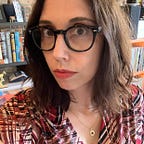Getting to Known You: Valerie Gono, Data Scientist
This former petroleum engineer has gone from shaking things up studying earthquakes to unscrambling data about plant-based eggs.
Valerie Gono built her career from the ground up, literally. She started as an engineer, studying human-made earthquakes caused by petroleum extraction. When she decided she didn’t want to be pigeonholed in an oil and gas career, she pivoted from engineering to marketing and moved from Houston to New York.
At Known, Valerie works as a data scientist on our media team, helping clients with media buying, planning and optimizing.
We talked about moving to the US from Indonesia at 16, what teaching and media planning have in common, and what crime procedural she wants to see made. (Hint: it involves data analysis).
Where did you grow up?
I grew up in Jakarta, Indonesia — most people don’t expect that answer. I moved [to the US] for college and assimilated very well. I sound like one of y’all.
How did you get to the US?
I moved here to go to a liberal arts college called Simon’s Rock [in Massachusetts]. I left Jakarta when I was 16.
It was right after 9/11, when almost every international male traveler had a three-month wait for a visa. My dad couldn’t come with me to drop me off at college — I did it all by myself. But it was a great experience.
Simon’s Rock had a program where you could transfer to another school for the last two years, and that’s how I got to Columbia. Then I went to grad school at UT Austin.
How did you end up in petroleum engineering?
I studied engineering in grad school. For my masters, I studied civil. Before that, I was doing research for a professor in the petroleum engineering department. The semester before I graduated he asked if I would be his TA. It was for a lab class, which I was actually teaching the class [on my own].
I really liked teaching, especially the interaction with the students. When I was a TA, I would tell them, “I want to help you to get the best grade that you can. I’m not here to make sure I take you down with a C. That’s not my goal. I want you to learn.”
For the most part, the people there wanted to be there, so that’s nice. I think it’s hard when your students don’t want to really be there.
Because of that experience teaching, I told them I wanted to apply for the Ph. D program. I got in and began my PhD journey to become a petroleum engineer.
More Getting to Known You: Susan Hoxie, SVP, Strategy
My research had to do with “induced seismicity,” which are human-generated earthquakes. I know it just sounds like this complex thing, but it’s a shift in the fault planes, specifically due to wastewater injection. In general, when you produce one barrel of oil, you produce 10 times as much water.
The wastewater is most of the problem, because it’s expensive to clean, and you can’t just discharge it to the lake. Instead, the wastewater is injected into the porous geologic foundations deep underground. Sometimes you inject where there’s a fault, and the slippage of the fault makes an earthquake. I studied that for three or four years, and I didn’t want to pigeonhole myself to just researching and teaching petroleum engineering.
How did you make the move to marketing?
I wanted to be back in New York, so I applied to like 200 different jobs. It was the pandemic, what else were you going to do?
I applied to Known, and they reached out to me. I really enjoyed the interview process, which — first of all — there was no take-home coding challenge, only a live one, and no “here’s a project, take it home for three days.” I did a few of those and then the companies never got back to me.
The first-round questions were riddles and math, like random problems, versus like, data science directly. They were assessing how you think. I really liked that because I am a nerd, and I like math problems.
What do you like most about your job?
Working directly with clients is a big reason I came here because when I started [in December 2020], the buyer role was in its infancy, and I got to define it. All the analysis I do now, all the media that we plan, and strategy, really affects the client and the business directly.
More Getting To Known You: Sam Karasik, Director, Data Science
We’re teaching our clients about what we do and a lot of times we’re also gaining the client’s trust, which is not as easy sometimes. It’s their right to be skeptical. Right. And that’s part of why they like working with us because they can be critical, and we will provide our POV. We’re transparent, which I think is really important. It feels good to know that what we’re doing is directly impacting a business in a positive way.
What’s your coffee order?
Oat milk cortado usually. Sometimes I’ll do normal milk.
What’s your favorite TV show?
Criminal Minds, and that show with the math people that isn’t quite accurate.
Numb3rs?
Numb3rs! Sure the math is not always accurate. But whatever man, somebody can do something now with his math degree. I feel like if there’s a TV show with agency and data people, I would like to watch that.
What’s a Little Known Fact about you?
I have a 1500+ day streak on Duolingo for Dutch. I splurged for Plus when I was on a corporate retreat [at a previous job] with no Internet so I could keep my streak. But now I just do it on the train. (As of May 20, her streak was 1585.)
Like riddles and math? Check out our open roles in data science and beyond.
